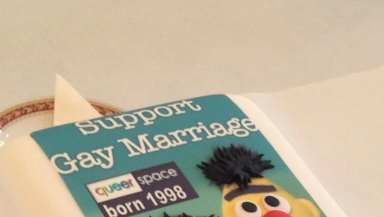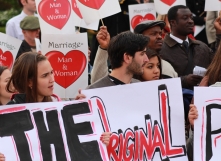
An unlikely alliance, if not exactly unholy, between Northern Ireland's Catholic Church and proudly Protestant Democratic Unionist politicians made headlines yesterday. The Bishop of Down and Connor, Rt Rev Noel Treanor, met DUP MLA Paul Givan at Stormont to discuss plans to insert a 'conscience clause' into the province's equality legislation. Politicians for decades, if not centuries, have found that bringing the two communities together has been extraordinarily difficult. In the end, however, it was a piece of cake.
Seriously?
Yes and no. The cake in question included the slogan 'Support gay marriage' and ordered by a gay activist from Ashers Bakery in Belfast. The bakery is run by the McArthur family, who are devout Christians and politely refused the commission, whereupon they were reported to the Equality Commission. The Commission accused them of breaching sexual orientation and political opinion discrimination laws and they are due in court on March 26.
It all seems a bit extreme.
Indeed. First Minister Peter Robinson described the decision at the time as "bonkers", writing that "The pursuit of this company is unnecessary, discriminatory and wasteful of public money." He also said that the pursuit "may be taken forward in the name of equality but it demonstrates an unhealthy and intolerant bias". On the other hand, actor Stephen Fry said on Twitter that the "religious right" were "twisting the truth to present themselves as victims".
Haven't we been here before?
On the UK mainland, certainly. There are huge questions about the rights of individuals who disagree with certain forms of sexual behaviour to express that disagreement through withholding goods or services. For instance, bed and breakfast owners Peter and Hazelmary Bull lost a case against two gay men because they wouldn't let them share a room. They suffered vandalism and abuse and faced huge pressures on their business. In the US, florist Barronelle Stutzman is going through something similar.
Can't people just live and let live?
That is very much the question. The argument of the Equality Commission is essentially that discriminating against someone because of their sexuality is no different from discriminating against them because of their skin colour. On the other hand, MLA Paul Givan – backed by other DUP members and supported by Churches on both sides of the confessional divide – argues that there should be a 'conscience clause' allowing people to opt out because of sincerely-held religious beliefs.
Will he win?
Probably not. Sinn Fein and other parties have pledged to block it either through parliamentary manouevres or a straight vote, which they believe they would win.
I find myself strangely torn on this issue.
You are not alone. The question is one of 'competing rights': on the one hand the right of Christians and others to express their faith, and on the other the right of citizens to be treated absolutely equally. The courts have judged that in the last analysis, it is the latter that triumphs. In the Supreme Court judgment in the Bull case, Lady Hale referred to "the continuing legacy of those centuries of discrimination, persecution even, which is still going on in many parts of the world" against homosexual people, concluding "It is for that reason that we should be slow to accept that prohibiting hotel-keepers from discriminating against homosexuals is a disproportionate limitation on their right to manifest their religion." The question of proportionality is at the root of the case.
Is a conscience clause actually feasible?
It would be difficult but not impossible to formulate a law which offered more protection on the grounds of religious conscience than is at present allowed – though such a law would be open to challenge at every level and it would be years before the issue was settled. However, that doesn't solve the question of principle: should someone be denied service because a customer is gay, for whatever reason? Equality campaigners also point out that while some people – including Christians – are high-minded, nice people who just have strong principles, others are nasty, hate-filled bigots who wrap themselves in the flag of Christian conscience. But there is strong support in Northern Ireland, certainly, for a 'reasonable accommodation' clause which would be tightly defined and able to protect people like the McArthurs or the Bulls. Simon Calvert from the Christian Institute, which is supporting Ashers, told Christian Today: "Most people think that this is an abuse of the equality law and that if there is some way in law that we can make sure these cases can't be brought on these very narrow grounds, it should be done."
Why exactly do some Christians have an issue with this?
At its root, there is a very strong feeling that homosexual behaviour is not justified by what the Bible says and that to support it in any way is to become complicit in something that's wrong. That's a view that has a long Christian tradition: the 2nd-century Church father Tertullian, for instance, imagines a Christian tradesman who is commissioned to work for a pagan temple justifying himself by saying "I must live" – to which he answers, "Must you?"
However, others would argue that no one who is simply obeying the law is compromised by it, as people are morally responsible for their own actions. Refusing to offer a same-sex couple a room doesn't affect their behaviour in the slightest, and it is arguably no one else's business what they do. On the other hand, it is easy to see how being made to create a slogan for such a cause could be so troubling: a passionate opponent of the Conservatives wouldn't like to have to write "Vote Cameron" on a cake, for instance. As Calvert says, "What the Equality Commission is trying to do is compel a Christian family business to promote a view with which they disagreed."
You aren't giving a very clear lead, here.
That isn't really the point of these conversations, and this one is more difficult than most. Yes, people should be free to follow their consciences. Yes, gay people should not face discrimination. It's troubling that there is such a concerted attempt to engineer the nation's beliefs on such a scale, such that it's almost impossible to express dissent about a particular moral trend. A liberal society ought to be able to accommodate the widest possible range of views, and it is surely not beyond the wit of politicians to frame legislation that would allow 'reasonable accommodation' and avoid the criminalisation of decent Christian people.
But Lady Hale was right: homosexual people have faced terrible persecution, and the world is a better and happier place because – in the West, at least – that is ending. That has been achieved largely through legislation. The problem is that the debate is now so polarised that any opposition to any right claimed by gay people – such as gay marriage – is seen as horrible bigotry, to which all right-thinking people are naturally opposed. It has to be said too that the behaviour of some Christian campaigners has not helped the cause of moderation or made it easier for politicians to argue for reasonable accommodation; the shadow of Westboro Baptist Church stretches all the way across the Atlantic.
There is a strong argument for saying that Christians, whether they believe that homosexual practice is right or not, should go the extra mile in offering hospitality to gay people as part of their witness to a loving God. Others will go down the Tertullian route and simply say, "No". In a liberal society, room should arguably be found for them to dissent legally and peaceably. In practical terms, as things stand it probably means that they should think very carefully before taking on certain forms of occupation or employment, particularly in the hospitality or service industries.

















